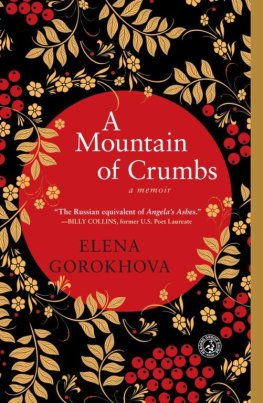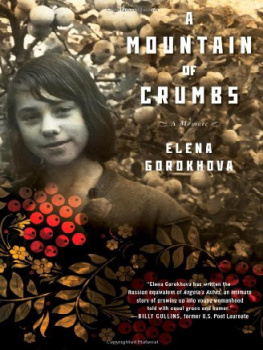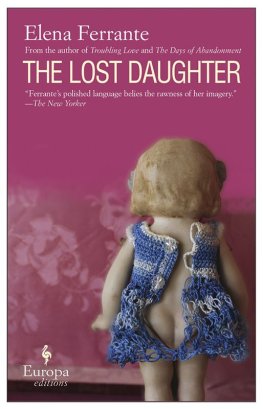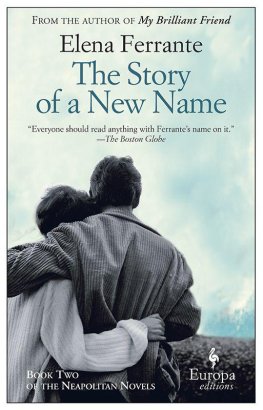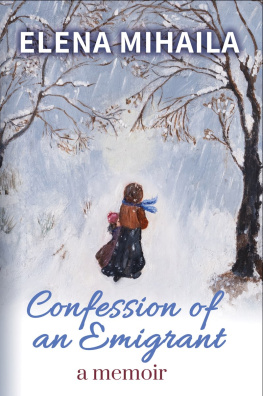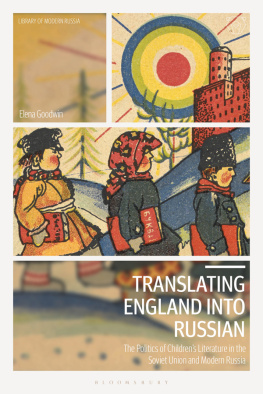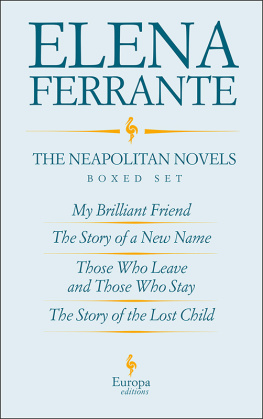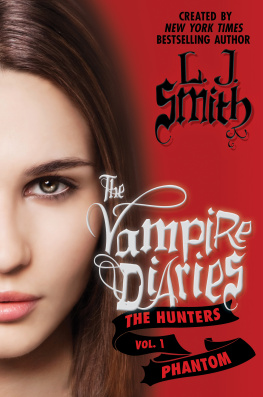Elena Gorokhova
A MOUNTAIN OF CRUMBS
A MEMOIR
For my mother,
Galina Konstantinovna Maltseva
I WISH MY MOTHER HAD come from Leningrad, from the world of Pushkin and the tsars, of granite embankments and lace ironwork, of pearly domes buttressing the low sky. Leningrads sophistication would have infected her the moment she drew her first breath, and all the curved faades and stately bridges, marinated for more than two centuries in the citys wet, salty air, would have left a permanent mark of refinement on her soul.
But she didnt. She came from the provincial town of Ivanovo in central Russia, where chickens lived in the kitchen and a pig squatted under the stairs, where streets were unpaved and houses made from wood. She came from where they lick plates.
Born three years before Russia turned into the Soviet Union, my mother became a mirror image of my motherland: overbearing, protective, difficult to leave. Our house was the seat of the politburo, my mother its permanent chairman. She presided in our kitchen over a pot of borsch, a ladle in her hand, ordering us to eat in the same voice that made her anatomy students quiver. A survivor of the famine, Stalins terror, and the Great Patriotic War, she controlled and protected, ferociously. What had happened to her was not going to happen to us. She sheltered us from dangers, experience, and life itself by a tight embrace that left us innocent and gasping for air.
She commandeered trips to our crumbling dachaunder the Baltic clouds, spitting rainto plant, weed, pick, and preserve for the winter whatever grew under the rare sun that never rose above the neighbors pigsty. During brief northern summers we sloshed through a swamp to the shallow waters of the Gulf of Finland, warm and yellow as weak tea; we scooped mushrooms out of the forest moss and hung them on thread over the stove to dry for the winter. My mother planned, directed, and took charge, lugging buckets of water to beds of cucumbers and dill, elbowing in lines for sugar to preserve the fruit wed need to treat winter colds. When September came, we were back in the city, rooting in the cupboard for gooseberry jam to cure my cough or black currant syrup to lower my fathers blood pressure. We were back to the presidium speeches and winter coats padded with wool and preparations for more April digging.
Maybe if I hadnt spent every spring Sunday ankle-deep in cold, soggy dirt, I wouldnt have been so easily seduced by the decadent sound of the English language that poured from the grooves of a record called Audio-Lingual Drills, my tutors pride. I might have gone to medical school, like my mother, or engineering school, like everyone else. I might have even married a Russian.
Maybe if I could have attached the word intelligentsia to her weighty figure in a polyester dress made by the Bolshevik Woman factory, I wouldnt have had to escape to America on an Aeroflot flight, a startled face gazing from the passport in my hand, a ravaged suitcase on the KGB inspectors table packed with twenty kilograms of what used to be my life.
MY GRANDFATHER, KONSTANTIN IVANOVICH Kuzminov, was a peasant. The countess who owned his village on the steep bank of the Volga five hundred versts from Moscow, feeling guilty for the centuries of serfdom, provided him with a scholarship to attend engineering school. My grandmother was the daughter of a factory owner in the textile town of Ivanovo, who employed most of the men in the village. They married two years before World War I broke out and five years before the Bolsheviks stormed the Winter Palace and the country exploded into civil war.
By 1918, when the altruistic countess, among throngs of panicked nobility, sailed from the Crimea toward Turkey, my grandparents already had three children, my mother and her two younger brothers. The revolution, with its promise of liberation from the yoke of absolutism and paradise for all working people, seemed to offer the hope that Russia was on the mend, that centuries of inequality and slave labor were finally over and peace and prosperity almost within reach. But in 1920 food rations shrank yet again and the pall of famine settled over the country, a dawn to the six decades of terror already bleeding on the horizon.
That was when my grandmother invented the crumb game. At six and five years of age, my mother and her brother Sima were old enough to ignore their growling stomachs and make do with nothing but a piece of black bread and a cube of sugar, but three-year-old Yuva, my uncle who would die during the first minutes of the blitzkrieg in 1941, clenched his fists and bawled from hunger.
Look at how much youve got, my grandmother would say as she broke a piece of bread and a square of sugar into crumbs with her fingers. A whole mountain of crumbs. My mother and Sima, older and wiser, would exchange a secret look of pity for their baby brother, who allowed himself to be so easily fooled. Two mountains, my grandmother would say. Yuva would stop wailing and rub the snot over his cheeks, pacified by this semblance of abundance, two whole mountains, more bread and sugar than the one sad little square on everyone elses plate, enough crumbs to pick at for a whole hour, to stick into his mouth one by one, plentiful and sweet.
By 1928 they lived in a two-story wooden housemy grandparents, their one daughter and now three sons, and Baba Manya, my grandmothers spinster sister, resourceful, doughy, and kind. She resewed old clothes for the children who grew too fast, kept three chicks in the kitchen until they were eaten by a cat, and later, during another famine, after World War II, bought the last rickety piglet off a horse-drawn cart that had stopped for a few minutes on their street. The pig lived under the stairs and saved them all from starvation the following year.
In 1929 my mothers younger sister, Muza, was born, the fifth and last child. God gave us another girl, announced Baba Manya from the porch where she stood in the breath of Indian summer, wiping her hands on an apron. Praise the Trinity in Heaven, in the name of the Father, the Son, and the Holy Spirit. She didnt know that a decree had come down from Moscow declaring religion deada sickly, fainthearted enemy kicked and stabbed and finally stuffed into the attic of the tsarist past.
Not God, protested my fifteen-year-old mother, flanked by her three younger brothers, standing knee-deep in clumps of dandelions, watching as my grandmother swaddled a flailing Muza, who was rapidly disappearing under layers of old sheets. Our mama gave us another girl.
May your tongues fall off, all of you, godless fooligans! yelled Baba Manya, hurriedly crossing herself. She meant to say hooliganshooliganibut she either couldnt pronounce the h sound or didnt know the right word. Thats what they all became, my mother and her three brothersfooligans, ardent and nave, resolute and reckless, inspired by a new god, a crossbreed of hooligans and fools.
IN 1931 MY SEVENTEEN-YEAR-OLD mother, who had inherited my grandfathers obstinacy and revolutionary fervor, pinned up her dark braids in hope of looking older and went to her first lecture at the Ivanovo medical school. Universities were now free, but candidates were accepted on the basis of their social class and not their merit: children of workers and peasants first, children of professionals last. Because my grandfather was no longer a peasant, my mother had to wait two months until a milkmaids daughter dropped out, creating an opening. In November, when rain washed over the dust covering Ivanovos roads and turned the town into lanes of mud, she became part of the first motley class of Soviet doctors, trained in the laboratory of the new state to be flung from their classrooms into the caldron of war.

